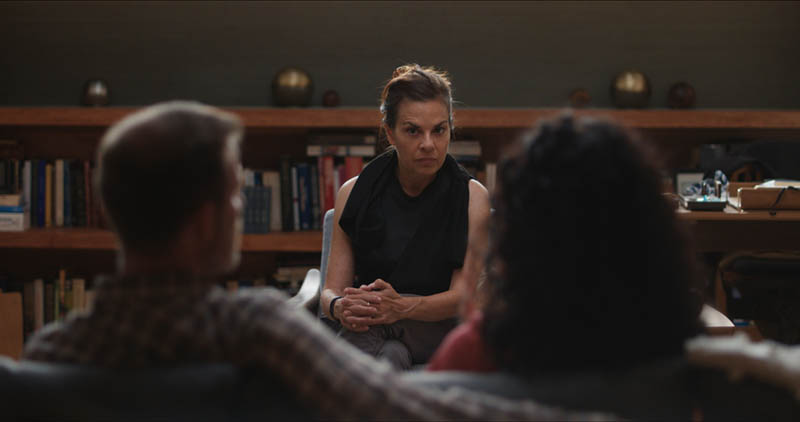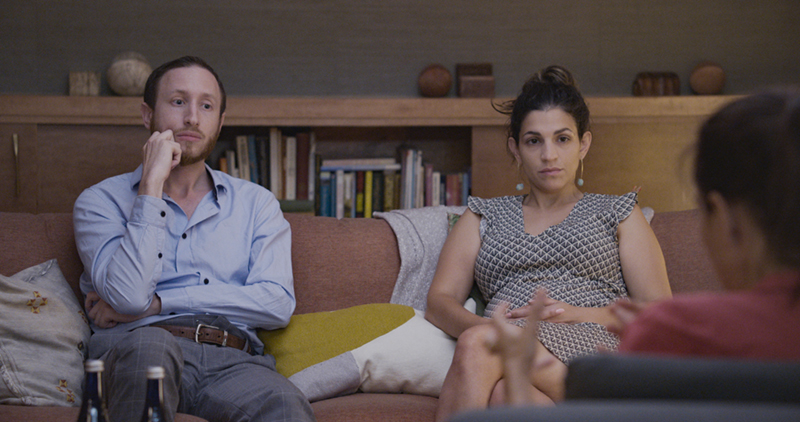Arts
Orna Guralnik Helps Real-Life Couples in ‘Couples Therapy’

It’s no wonder that Showtime’s docuseries Couples Therapy has fascinated viewers. Its star, Israeli-born clinical psychologist Orna Guralnik, is an expert at gently shepherding couples through their relationship difficulties. Now starting its third season, the popular show provides an intimate look into marriage’s ups and downs as it chronicles Guralnik’s real-life therapy sessions.
Each season highlights different American couples and their struggles around a range of conflicts and issues—among them depression, alcoholism, pandemic and post-pandemic stress and the difficulties of young parenthood. Viewers watch as Guralnik’s expert counseling and direct, yet empathetic words make a difference, often leading to profound changes in individuals and relationships.
“I learned a lot from doing the show,” Guralnik acknowledged at a Television Critics Press Tour. She said she has become a better therapist “seeing myself, seeing what works and what doesn’t.”
Guralnik, who also has a private practice in New York City, talked with Hadassah Magazine about her series and how her Israeli background impacts her work. This interview has been edited for brevity and clarity.
While you now live in Brooklyn, you grew up in Israel. Can you tell us a little more about your background?
I was born in the United States and moved to Israel when I was 7 years old, thus I spent my formative years there, where I also served in the army and earned my first degree at Tel Aviv University. I moved back to the U.S. for grad school, and received a Ph.D. in psychoanalysis from NYU.
I was born in the ‘60s and moved to Israel in the ‘70s. I witnessed Israel transform from a relatively socialist country to an uber-capitalist country. Watching all that change in Israel was a very deep learning experience about humanity and our attachment to various ideological structures.
Having shifted between cultures has been an important part of my identity as a psychoanalyst, in terms of being able to grasp at the way people see things—their identity, the ideologies that govern them, the way they interact with people are all very culturally determined.
How has your Israeli background and values shaped the advice you offer couples?
I think Israelis are much more comfortable with emotional states, like intense feelings. So that’s been a good background training for me to become an analyst. Israelis are comfortable with feelings. They talk about them.
Also, [like other Israelis, I] am more direct, which has helped my work as an analyst. That’s one of the things people like about my work, as I speak directly, though it has its plusses and minuses.
Season two was filmed during the pandemic, and a number of episodes showed sessions that were on Zoom. How did the pandemic impact the couples you treated?
I witnessed an exacerbation of tension and conflict, but all these stressors have been mitigated by a wonderful human spirit of adjusting to the existential crisis with increased forgiveness, rationality and tolerance. All and all, couples stepped up in the direction of being their best selves.
Most couples have different reactions depending on a mix of major existential factors: the shock and anxiety of a world pandemic; proximity to death and risk; threats to work and the social matrix; and the different ways profound social issues surfaced around the pandemic, depending on privilege and race.
Plus, if the couples have kids and the obvious major upheaval of schools that were being shut down and kids at home that demanded parental support—all these intense factors exist while being locked down together!
Couples easily became polarized and almost artificially assume more extreme positions unless they approach their differences with a basic stance of curiosity and mutual respect.
Do you ever think you should have changed your advice or something you said after you have watched the show?
Yes, I do. Watching the process unfold and knowing how things developed, at times I wish I emphasized other issues. I learn from watching the show.
Do you stay in touch with the couples from previous seasons?
The directors and I stay in touch with the couples, to some degree. It is important for us to support them around the end of this intensive kind of treatment, to make sure they are set for continuation of treatment, if needed. Of course, around the airing of the show, we make sure they are prepped for seeing their work and are there for them as they face public exposure.

Season two included Michal and Michael, a young Jewish couple with young children and a new baby. Can you tell us about their struggles with parenting?
Michal and Michael are a modern Orthodox couple. They are both deeply compelling, brilliant and funny, but were also very much in need of help with a troubling dynamic that has developed between them. That’s not unusual for couples adjusting to becoming parents to young kids. A chasm has developed between them on the distribution of various household labors.
I have talked with the couple since the show completed, and they are doing really well. As a psychoanalyst, I don’t really give advice, I interpret dynamics. Interpreting their dynamic was really helpful for them. They took to it well and really responded to the language of therapy.
What is the biggest challenge about being on television?
The most difficult aspect has been navigating the impact it has on my private-practice patients, some of whom have not consented to working with an analyst who is suddenly a public person.
Outside your work as a therapist, what issues are important to you?
I support the Parents Circle-Families Forum, a group that supports bereaved families of both Palestinian and Israeli victims of the political conflict between these communities. I believe the work they do is enlightened and an expression of the highest form of humanity and compassion. I also consistently support organizations that are devoted to the massive climate crisis of which we are in the midst, such as Extinction Rebellion.
As for women’s issues, feminism is the movement that shaped me as a person—my intellectual and political being. My work as a couples’ therapist is an expression of feminist ideology.
Season 3 of Showtime’s Couples Therapy starts on May 13th.
Susan L. Hornik is a veteran entertainment and lifestyle journalist.









 Facebook
Facebook Instagram
Instagram Twitter
Twitter
Leave a Reply